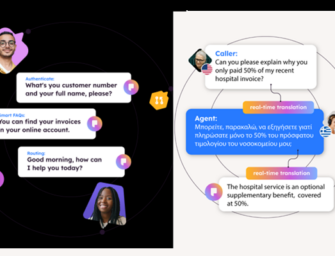GM to Provide the First Full Alexa Auto Implementation and It’s Different Than What Came Before

(Photo by John F. Martin for Cadillac)
General Motors announced Wednesday that “millions of Chevrolet, Buick, GMC and Cadillac owners the ability to add convenience and productivity to their daily drives through a new in-vehicle Alexa experience coming in the first half of 2020. Leveraging embedded available 4G LTE connectivity and GM’s updateable embedded app framework in the vehicle, GM will make Alexa available on model year 2018 and newer cars, trucks and crossovers with compatible infotainment systems.”
The implementation leverages the Alexa Auto Software Development Kit (SDK) and, as you would expect, provides access to Alexa skills and services similar to what you would find in the home. GM pointed out that navigation requests are integrated with the embedded navigation system and the Onstar turn-by-turn audible solution for cars that include these features.
There are also calling and media search and playback features. Notably, the implementation also includes the ability to use Alexa to control car features while driving. The nature of the implementation immediately made GM Amazon’s most important automotive partner for Alexa.
Alexa Auto Strategies
Up to this point, Alexa has been available in the car in three different types of implementations. There is the device approach where a third-party device from Amazon, Anker, or another company provides an in-car solution that connects by USB port or Bluetooth to become Alexa’s ears and a bridge to the smartphone to operate while driving. Toyota has created a different app-based approach that projects Alexa from a smartphone into the car similar to how Apple CarPlay and Android Auto work.
Finally, Audi, BMW, and others have implemented a hybrid approach where Alexa is an option for certain types of queries but an embedded assistant, usually from Nuance, controls the in-car experience and operates simultaneously with Alexa. GM is offering Alexa in a new approach as a sole voice assistant in the car.
General Motors All-in Option for Alexa
General Motors, an Amazon spokesperson told me, represents the first automaker to use the complete Alexa Auto SDK. Other automakers had employed a variety of solutions but always chose to implement a subset of the functionality. Granted, the full Alexa Auto SDK has not been generally available for long.
Alexa previously required persistent cloud access to operate but in early September 2019, the company rolled out the Alexa Auto SDK 2.0 update. Voicebot wrote at the time of the announcement that it meant “certain Alexa skills and abilities can be accessed and used even if the car is in a tunnel or an area with poor internet service. This means music, navigation, phone calls, and other controls can be run through voice commands regardless of the car’s location.”
Automakers needed Alexa to break free of its cloud tether because cars have a habit of traveling to places where internet connectivity is weak or nonexistent. Using this feature, GM now asks users to select either Alexa or their legacy assistant which is provided by Nuance. Only one can operate at a time. I was told during a demonstration that Alexa was able to control all of the in-car features that previously were handled by GM’s embedded assistant but that Alexa can provide many more services that originate outside the car.
The Value to GM
The value of this arrangement to Amazon is immediately obvious. The company gets a new dedicated Alexa endpoint outside the home. However, GM has its own benefits in mind.
Research by the automaker revealed that consumers prefer to use “the same voice assistant in their vehicles as they do in the home” according to the announcement and a GM spokesperson available onsite for the Amazon Alexa product launch event last week. A J.D. Power study commissioned by Amazon earlier this year came to a similar conclusion in finding that 3-in-5 consumers want the same voice assistant they use in the home to be accessible in the car. Santiago Chamorro, vice president for Global Connected Services, GM, was quoted in a media release saying:
“Bringing the Alexa experience to our vehicles is an example of how we are listening to our customers’ feedback, and offering them the voice technology of their choice.”
No Simultaneous Assistants or Talk to Wake
The setup for GM vehicles will be familiar to Sonos users that can select either Alexa or Google Assistant as their default but not use them simultaneously. Drivers of GM cars will be able to select the GM assistant or Alexa. Interestingly, this announcement comes just one day after Amazon announced the Voice Interoperability Initiative which is encouraging device makers to provide simultaneous access to multiple assistants. BMW has signed onto that agreement, but GM was not part of the announcement.
To date, most automakers have been loath to give up their own assistant where they can control the data and experience. They are providing additional assistants as value-added services for consumers but always as simultaneous access points. An Amazon spokesperson told Voicebot that the company has made Alexa Auto SDK flexible so automakers can employ Alexa in whatever manner best meets their objectives. With that said, I’m not sure Amazon is lamenting that many GM vehicle drivers will soon only be using Alexa in the car and the home.
The other missing feature in the new GM implementation is talk-to-activate. At least at launch, GM drivers will need to touch either the physical button on the steering wheel or a soft-button on the infotainment center screen to wake Alexa. That may be one reason that only one voice assistant is active at a time. Using a physical button to activate two different voice assistants would quickly run into usability issues. For now, that means Alexa loyalists will have an Alexa-only experience while driving GM vehicles.
Follow @bretkinsella Follow @voicebotai









